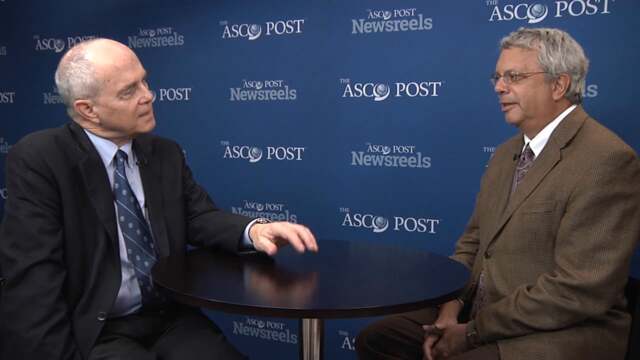James H. Doroshow, MD, on The NCI’s MATCH Trial
2015 ASCO Annual Meeting
James H. Doroshow, MD, of the National Cancer Institute, describes a new precision medicine initiative called the MATCH trial: Molecular Analysis for Therapy Choice. In 2,400 NCI clinical trial sites, 3,000 patients will be screened and their tumors analyzed to determine whether they contain genetic abnormalities for which a targeted drug exists.
Related Videos
Charles L. Bennett, MD, PhD, MPP and James O. Armitage, MD
Charles L. Bennett, MD, PhD, MPP of the University of South Carolina College of Pharmacy, and James O. Armitage, MD, of the University of Nebraska Medical Center, discuss the emerging and future benefits of biosimilars.
Areej El-Jawahri, MD, and Eric Roeland, MD, FAAHPM
Eric Roeland, MD, FAAHPM, of the University of California, San Diego Moores Cancer Center, and Areej El-Jawahri, MD, of Massachusetts General Hospital, discuss two important studies on early palliative care and the use of anamorelin in advanced NSCLC with cachexia.
Carolyn Jean Presley, MD, and James L. Mulshine, MD
James L. Mulshine, MD, of Rush University Medical Center, and Carolyn Jean Presley, MD, of Yale Cancer Center/Yale School of Medicine, discuss the burden on patients and the Medicare system as new lung cancer CT guidelines are put into effect and treatment of early-stage NSCLC increases (Abstract 7533).
Ruben A. Mesa, MD, and James O. Armitage, MD
James O. Armitage, MD, of The University of Nebraska Medical Center, and Ruben A. Mesa, MD, of the Mayo Clinic, discuss pacritinib and its significant efficacy in myelofibrosis (Abstract LBA7006).
Howard M. Sandler, MD, and Christopher Sweeney, MBBS
Christopher Sweeney, MBBS, of Dana-Farber Cancer Institute, and Howard M. Sandler, MD, of Cedars-Sinai Medical Center, discuss the improvement of overall survival with the use of adjuvant chemotherapy following androgen suppression and radiotherapy (Abstract LBA5002).





